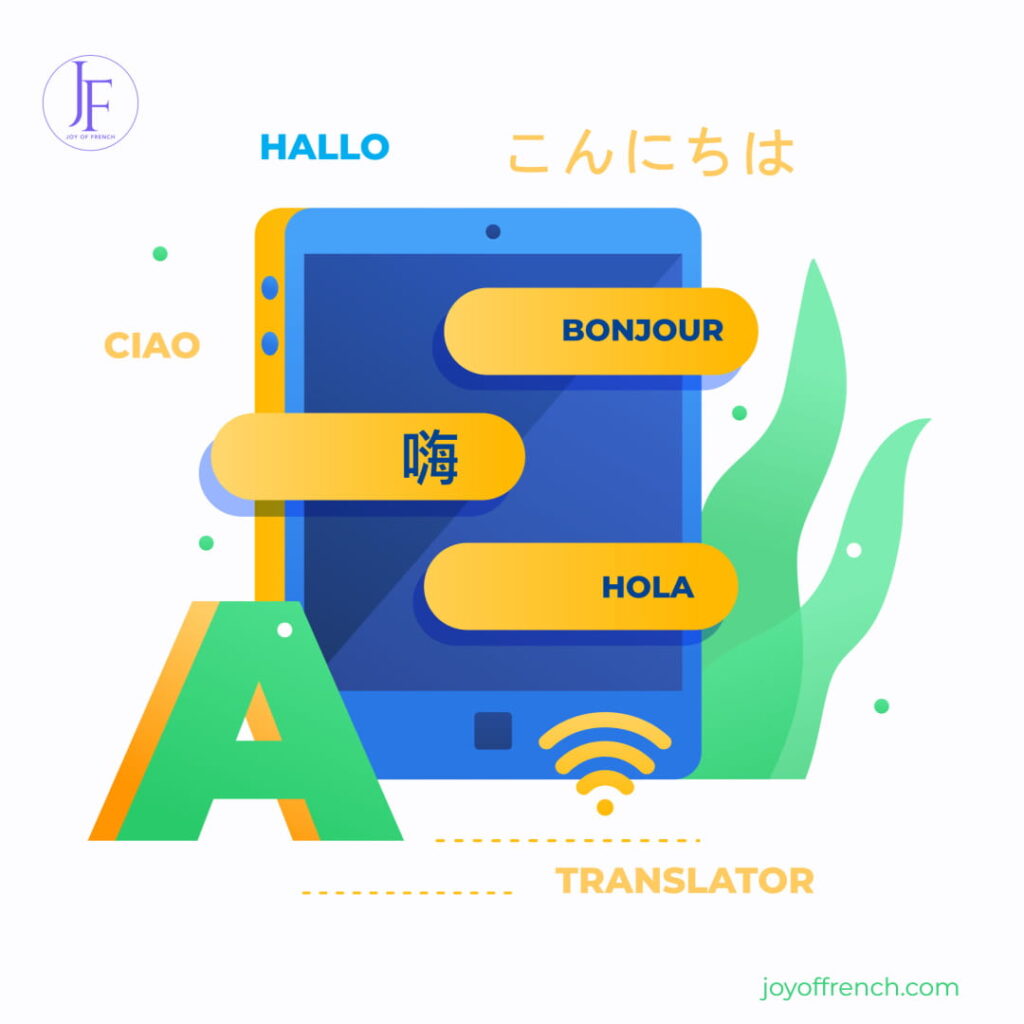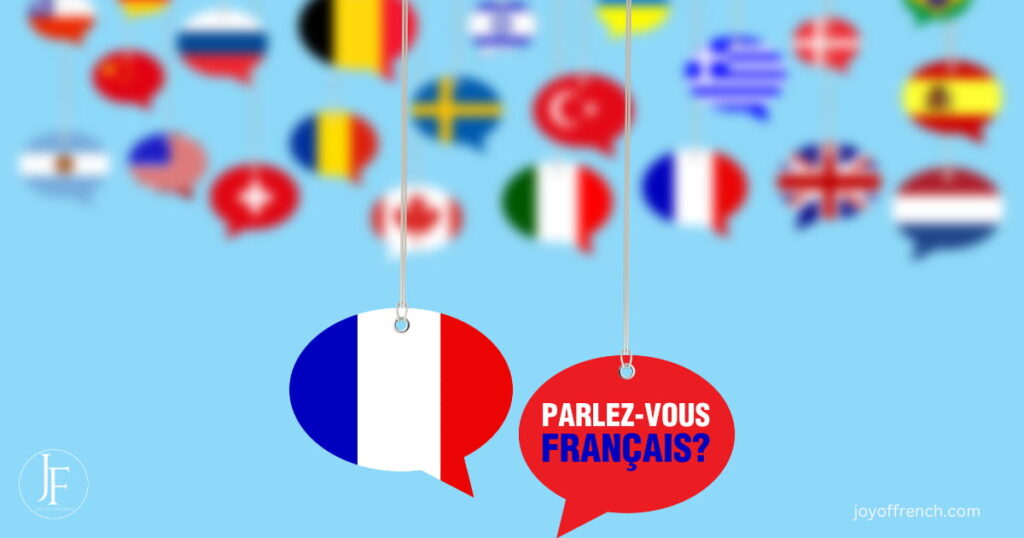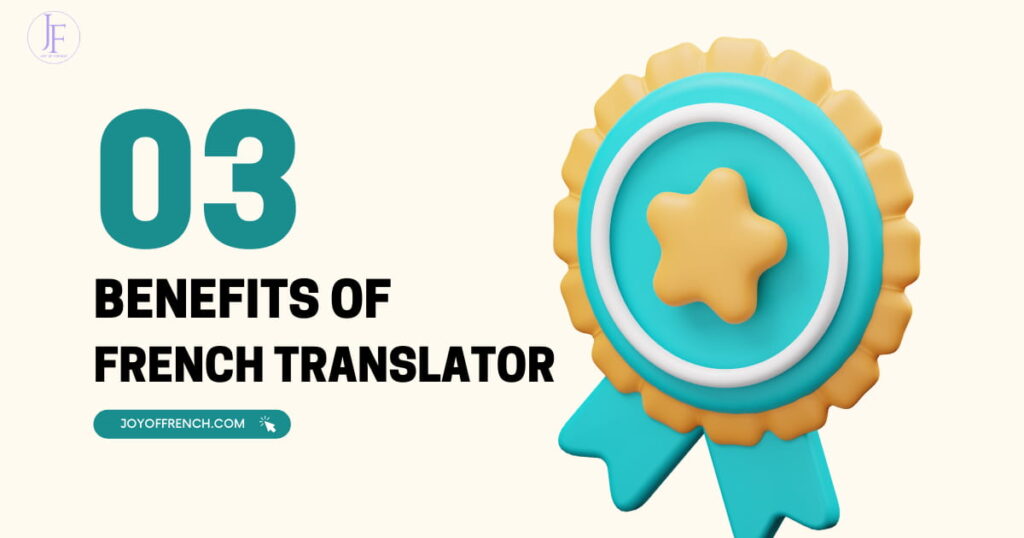Working as a translator is often a top goal for those interested in learning French. People passionate about foreign languages, including those studying French, prefer to work towards this dream.
Besides communication, there are other reasons why you should learn French.
These include cultural factors such as dramas, movies, music, songs, dance, etc. Plus, many job opportunities are available for those who know this beautiful French.
As a result, French is becoming increasingly popular to learn. With over 300 million speakers, it is the fifth most spoken language globally.
French-speaking countries have thriving markets and entertainment industries. This makes French a valuable language, opening up career options in various sectors.
One of the employment options available to those proficient in French is translation. Being a translator can be a fantastic choice, as it offers high income and flexibility.
Those who are pursuing advanced-level French will find this profession particularly interesting.
When considering a French language translator career, you may wonder about the benefits, requirements, and prospects. What are the likely earnings, various work profiles, and where can you find job options?
This article will provide a complete overview of the French translation profession. It covers all aspects of the job. Let’s get started.
Table of Contents
What is the job of a French translator?
The job of a French translator is to convert written content. This could be any text or document from one language (source) to another (target). To do this work, you should be skilled in at least two languages, including French.
You may have French as your second language and Japanese as your native tongue, for instance. Depending on your language proficiency, this would help you translate Japanese into French and vice versa.
The main goal of a French translator is to accurately convey the language’s flow, context, meaning, and style.
Translators must be culturally sensitive and aware of the contrasts between the source and the target language.
A French translator has many important responsibilities and tasks. E.g., maintaining confidentiality, assuring quality and correctness, meeting deadlines, and more.
Accurate translation is vital in most business meetings, conferences, live events, and international seminars. Before trying to solve a problem, it is imperative to understand every detail.

Can machines replace human translators?
Is it possible for machines to replace human translators?
In short, the answer is no.
Machine translation has made substantial progress in recent years. Still, it has yet to achieve a level where it can entirely replace human translators for all types of work.
Artificial intelligence and neural networks are part of machine translation. It can be instrumental in specific scenarios, but there are limitations.
Easy availability, cost-efficiency, speed, and consistency are apparent benefits. Yet, it is unsuccessful in many critical areas.
The machine struggles with understanding context, idiomatic phrases, cultural nuances, and contexts. It needs an infusion of creativity as well.
Language structures are complex. That’s why computer translations are literal and may not capture the intended sense.
It doesn’t produce sound output for specialized or technical topics. The explanation is the need for domain-specific knowledge and experience.
Depending on the topic and language, the quality can vary greatly. This is suitable for less formal conversations. Still, it often needs humans for more professional, high-stakes material.
It could jeopardize the security of sensitive or confidential data. This is the outcome of the content going through external servers or databases.
Human post-editing is necessary for machine-generated translations. The goal is to achieve better precision and readability. Thus, this cancels out initial time-saving and cost benefits.
To put it simply, machine translation has its own place. It is a valuable tool for specific tasks, especially those that require speed and affordability.
But it can’t replace human translators for tricky, nuanced, or culturally sensitive content. A deep understanding of language, context, and customs is paramount.
The need for professional French translators continues to be high globally. They play a crucial part in meeting challenging and mission-critical needs.
How does it differ from interpretation?
Converting one language into another is part of the linguistic processes of translation and interpretation. Both fall under the umbrella of language services, but they are distinct.
They vary in the medium, mode of communication, and specific skills involved.
There is a key difference between translation and interpretation.
The translation is about dealing with written text, carefully looking at it, and making necessary changes. French Interpreting requires real-time speaking and thinking.
You must be good with languages and know about different cultures for both professions.
Being an interpreter is way more complex than being a translator. This is clear in their salaries, as they receive relatively higher pay.
This is because interpretation often occurs in real time. It requires native-level skills, greater accuracy, and proactivity. Their access to helpful tools and time for research is restricted.
The different kinds of translation
The field of translation is diverse. It is possible to restate various sorts of texts.
Translation services come in various common types. Each has its own specific goals and conditions.
Three broad categories exist. Let’s examine all the details.

(i) The General Translator
These translators are the first to enter the profession. As an outcome, they are commonly called “generalists” or “general translators.”
The work doesn’t call for specialized content.
It’s easy to understand, even with little experience or expert knowledge. Any professional translator can handle the task.
The text might include various French dialects, technical terms, and slang. This may prove challenging. Most people can grasp it if they put in some effort and do their research.
The services and product details fall under typical business information. This translation group includes the website’s content, social media, non-technical reports, etc.
(ii) Specialized translator
A specialized translator and general requirements are vital to handle this translation.
The duration to reach an advanced level in French varies based on different factors. The process of becoming a translator spans 2 to 5 years. It takes effort and time to establish authority in technical fields.
Specialized translations are available in different forms. Some examples are marketing, technical, legal, business, financial, scientific, travel, medical, and software localization.
The popularity of TV series and films for French learners is increasing today. As a result, there has been an immense surge in multimedia content.
There is a high demand for voice-overs, subtitles, dubbing projects, and scripts. The demand for French songs and music is also on the rise.
The work areas include translation, transliteration, and audio-related tasks. These markets have been flourishing in recent years.
Do you enjoy reading literary works?
You can translate French texts into your native language. It contains short stories, plays, essays, poems, articles, literature, artistic texts, and history.
The conversion market is significant in research, science, and self-help. The publishing industry and educational books offer plenty of job options.
Unique skills, expertise, and methods are required for each work profile. Translation agencies offer specialized services in various fields to ensure quality and customization for their clients.
(iii) Transcreation
Transcreation aims to convert content between different languages.
This approach maintains the same tone, purpose, context, purpose, and style. The sentences in this method also remain unchanged.
By leveraging their cultural knowledge, translators can enhance content through innovation. This will attract a bigger audience because of its aesthetic appeal.
This text presentation method enriches reader comprehension. Many elements, of course, contribute to that.
Localization, marketing, and cultural nuances become more captivating with language-based discussions.
Most of these services are offered by copywriters. These tasks can be supported and completed by creative translators. They receive higher pay than translators.
How promising is the career of a French translator?
Translation offers an exciting career choice for several reasons. Now, let’s delve deeper into this.

1. Flexibility is one benefit of freelancing
Freelance French translation allows for a relaxed lifestyle.
Self-employment is prevalent in this line of work. This is the reason a language-related career is so fulfilling! Be in control of your schedule and work for yourself.
The combination of innovative technology and fast internet is critical to successful employment. It’s cool because you can do it anywhere in your comfort.
With a fixed plan, there is no need for time management. You have the freedom to select your workspace, working hours, and pay rate. You have a less rigid work schedule.
Imagine you have a translation project that could take around 100 hours. You have the flexibility to complete your hours at your own pace now.
There are no restrictions on how much time you can spend on it each day or week as long as it’s finished before the due date.
You can earn money while they get what they want by doing things your way.
2. You can earn plenty of money with hard work
French translators are in high demand in the market. The need is increasing in all nations because of international trade and global market expansion.
There is always a necessity for skilled translators. Their expertise, domain, and experience result in higher earnings.
The average salary for translators is higher compared to other language-related jobs. This has led to many candidates aspiring to become French translators.
For non-English languages, French is one of the top picks. The less popular language mix can make your resume more noticeable. But keep in mind that you may have fewer employment opportunities.
The outstanding pay for translators is attributed to the rise of Francophone regions in global business.
Freelance translators’ income depends on the task, page, word count, or hourly rates. By choosing a full-time assignment, you’ll receive pay on a weekly or monthly basis, depending on your schedule.
3. You’ll gain relevant and valuable skills
Many discoveries await you on your journey as a translator. You will improve your editing, grammar, and writing. You will also expand your word list.
You’ll also enhance your understanding of Francophone people and cultural sharpness. You will also gain knowledge of industry-specific facts.
Owners of businesses can establish a customer network, interact with clients, and oversee projects. You have a knack for multitasking and managing various tasks concurrently.
You must understand the technical details. You’ll also learn how to handle various software and French language learning apps in your job. Understanding digital products from a technical viewpoint is helpful.
The disadvantages of being a translator
Like everything else, there are drawbacks.
The first thing to note is that there is no guarantee of work. It’s common for income to fluctuate.
Short-term contracts are standard for translators. It can be worth it to have freedom and flexibility. Despite this, you continue to deal with stressful tasks and deadlines.
Working hard is necessary to impress clients and uphold your reputation.
You may not regularly get the job you want. Freelancers often experience long periods without work. French translators deal with that issue.
There have been advancements in machine learning. The scenario has raised worries about the future employment prospects for translators of the French language.
It is unlikely that machine translators will replace human translators. Still, online translators such as Google and Bing Translates are simple to use.
When companies need translators for urgent work, they hire them. There is still a significant amount of work for skilled experts.
Boredom may be experienced by translators in the future. The nature of the job is such that only a select few can handle the repetitive work and constant computer staring.
If you crave creativity, there may be a better career choice. Despite some flaws, translators are more lucrative than their known shortcomings.
How to pursue a career as a French translator?
Translating is the ideal career for French learners. There are multiple reasons it makes sense.
Most language jobs pay less than translators.
Having the ability to work and travel from anywhere gives you an edge. French is easy to understand, but you can rapidly enhance your skills.
What steps must be taken to turn it into a reality?
Here are four must-have requirements!

1. Qualifications needed for translators
A bachelor’s degree is necessary to become a translator. Possessing a specific degree or a diverse set of subjects is not required.
The best way to become a translator is to learn and improve languages during school or college.
A complete education in French, with both a Bachelor’s and Master’s degrees, can open doors for full-time careers in translation.
Customized certification courses are available for translators as well. Achieving a higher level of mastery will allow you to do this. As a case in point, C1 or C2 of DALF.
Ensure you know industry standards, specific details, and language talents. Your understanding of technology, intricacies, technical elements, and manners will also have practical benefits.
2. Having a superior level of French competence
Highly skilled translators must be proficient in at least two languages. The highest level in official language tests is the most advanced or the near-native.
You can find work that requires French, even if it’s not your first language.
The study covers more than just grammar. French studies include reading newspapers, watching TV shows, and reading books.
You’ll gain a more profound knowledge of the Francophone world. Your experience will prosper more than you become more fluent in the language.
Aim for the highest mastery level to become a French translator. Keep improving your language skills until you become advanced.
Being fluent in at least two languages is a must. Having a native or CEFR level of C1/C2 of DALF in a similar reference system is advisable.
Enrolling in a university’s long-term French program could be a wise decision. Stand out by enrolling in a customized translation program.
Independent study or tutoring can cause earning official diplomas.
Employees typically request reliable documents to verify French language skills.
DELF or DALF diplomas show your level of fluency. The odds of getting hired as a translator are in your favor.
3. Expertise in writing and translating abilities
Do you possess innate talent in the target language and exceptional writing skills?
If this is the case, then deciding to translate would be wise.
There’s no room for insincerity, negligence, and incompetence. A fantastic translation needs more than just language ability.
Even if you are proficient in French, you must improve your interpretation skills. One of the many criteria for success in translation is being fluent in two languages.
Adapting to different writing styles and having strong writing skills for different situations is crucial.
4. Creating contacts, networking and referrals
Translation is crucial for the success of nearly every company. Online job boards and classified ads aren’t the best ways to find these options. A solid resume and a network of contacts can motivate you to succeed.
It’s practical for freelance translators to improve their connections. The more references you have, the better off you’ll be in the long run.
One method to achieve that is by creating an online profile on a job site. Websites like LinkedIn enable you to connect with HRs and recruiters.
Broaden your network by connecting with industry experts. Send your CV directly if you want to work for a specific company.
How do I get the translation project?
Employers offer software that enables computer translations. This can aid you in finishing your task. Remote work is both simple and practical.
Regardless of your location, you can work on any device.
It’s typical for translation firms and service providers to involve French language experts.
Remember not to spam them while compiling a list of agencies to contact. It might be better to check out their websites.
Do you plan on working as a freelance translator in a competitive market?
If that’s the scenario, having marketing and business skills will be needed. The more educated and experienced you are with language, the better.
A strong network can make a world of difference in French translation.
How much money can French translators make?
A high salary is widely recognized as a primary incentive in this field.
Translator salaries vary. Pay is influenced by factors such as language skills, job experience, and type of work.
It’s equally important to consider location and language combinations. Having advanced French language skills and a strong background can lead to a higher salary.
Consider translating, transcreating, or transcribing less popular tongues. Your earnings will surpass those of a translator for widely spoken languages.
Expect a decent salary if an organization employs you. Factors like word count, page count, and project size dictate the price for freelancers.
Final Words: Is a career in French translation right for you?

If you speak French, it might be difficult for you to imagine a demanding career in translation.
Hard work and big dreams lead to success. Don’t give up, even if it requires a lot of motivation and persistence!
Becoming a translator can be rewarding if you have a strong work ethic and a love for French. Take into account the pros and cons before making a choice.
French learners often consider translators to be one of the most desirable professions.
High salaries, expanding work, and flexible hours are some reasons. The sky is the limit if you are passionate about the French-speaking world.
LanguageNext offers a wide range of offline and online French classes with certificates to help you cement your future as a translator.
Are you interested in becoming a French translator? Write your views in the comments section to express your opinion and ask questions!







